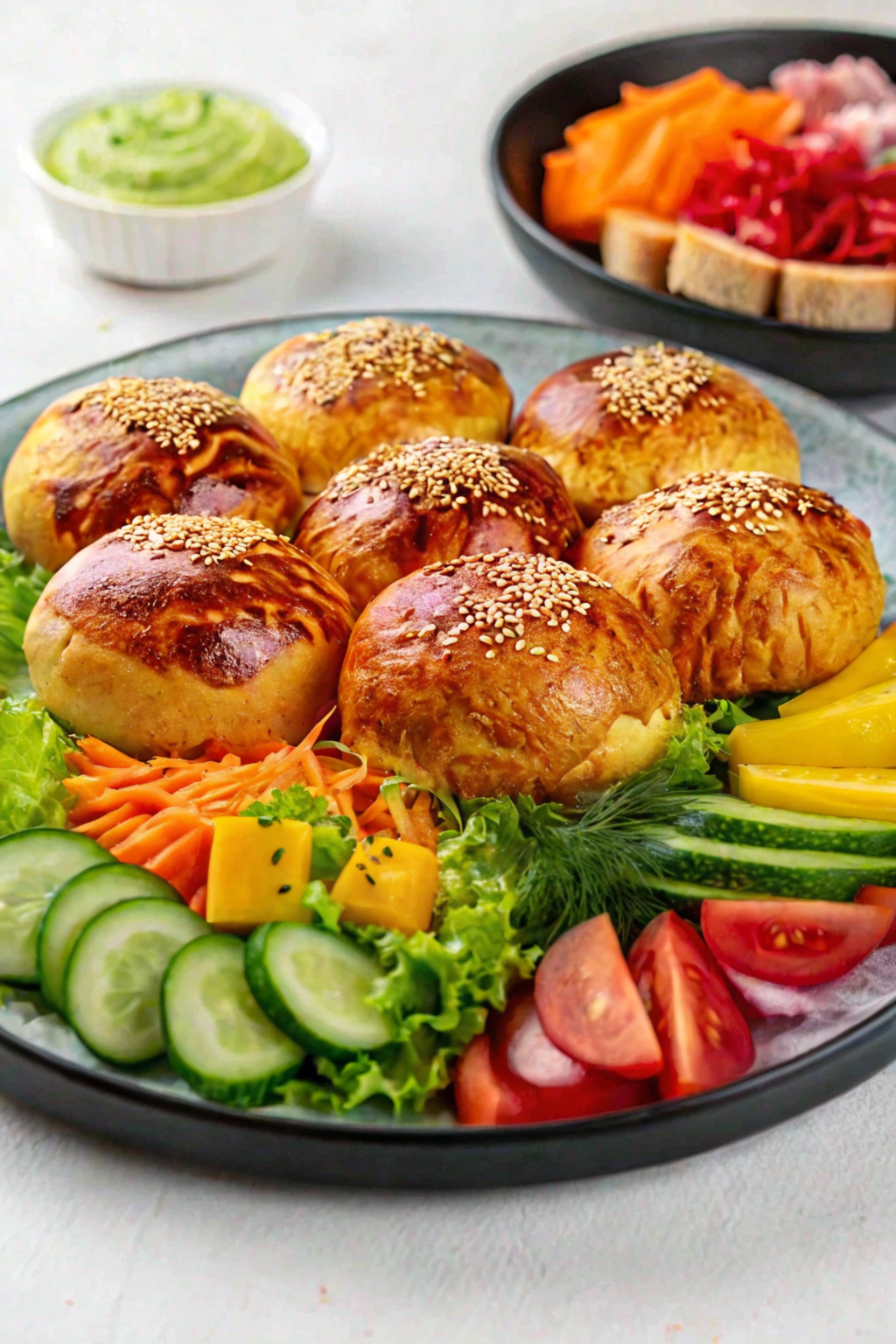Welcome to the bustling streets of Istanbul, where the aroma of freshly baked poğaça (poh-ah-cha) fills the morning air. These incredibly soft, golden-brown breakfast buns are the heart of Turkish breakfast culture, and today, we’re sharing this treasured recipe with you!
The Art of Traditional Poğaça
Picture this: It’s early morning in Istanbul. Local bakeries are pulling out trays of golden, sesame-topped buns, their aroma drawing in sleepy customers. These aren’t just any bread rolls – they’re poğaça, the pillowy-soft buns that have graced Turkish breakfast tables for generations. Today, we’re bringing this magical morning tradition to your kitchen!
What Makes These Buns Special?
Turkish poğaça is unique in the world of bread. Unlike dinner rolls or typical breakfast buns, these special treats have:
- A cloud-like, tender texture
- A perfectly golden, sesame-studded top
- A subtle richness that pairs perfectly with morning tea
- The ability to make your kitchen smell like an Istanbul bakery!
Cultural Notes
In Turkey, these buns are more than just bread – they’re a morning ritual. Families gather around breakfast spreads called “kahvaltı” where these warm buns take center stage. They’re often enjoyed alongside fresh vegetables, olives, and endless glasses of Turkish tea.
Ingredients
For the Dough:
- 240ml warm water (110°F/43°C)
- 240ml warm milk (110°F/43°C)
- 2¼ teaspoons active dry yeast (or 1 packet fresh yeast)
- 4 tablespoons sugar
- 240ml vegetable oil
- 1 large egg
- 2 teaspoons sea salt
- 875g all-purpose flour (approximately)
For the Golden Crown:
- 1 egg yolk
- 1 tablespoon sesame seeds
The Art of Making Poğaça
Yeast Preparation:
- In a large bowl, combine warm water and milk (approximately 110°F/43°C)
- Sprinkle yeast and sugar, combine gently and let rest for 5 minutes
- Wait until the mixture becomes frothy and active
Preparing the Dough:
- Once the yeast mixture is frothy, add oil and egg
- Begin adding flour gradually in small portions
- Add salt when half the flour is incorporated
- Knead until the dough becomes smooth and elastic (about 10 minutes)
- Let it rest for 45 minutes, covered with a warm, damp cloth
Shaping Your Morning Joy:
- Divide your dough into 20 pieces
- Shape each piece like you’re cradling a small bird
- Place them on your baking sheet, giving each room to grow
- Brush with egg yolk and sprinkle sesame seeds like morning dew
- Let them rest once more (15 minutes)
- Bake at 375°F (190°C) until golden like an Istanbul sunset (20 minutes)
The Art of Presentation
In Turkey, presentation is everything. Create a beautiful kahvaltı (breakfast) spread:
- Arrange your poğaça on a traditional serving plate
- Surround them with fresh, crisp vegetables:
- Sliced cucumbers
- Ripe tomatoes
- Colorful bell peppers
- Fresh herbs
- Add a bowl of green herb sauce (like the one in our photo)
- Garnish with fresh lettuce leaves
- Serve with black tea in traditional Turkish tea glasses
Chef’s Wisdom
- The dough should feel like touching a cloud – soft but not sticky
- Never rush the rising process – patience brings perfection
- Keep the dough warm during rising (wrap it like a precious gift)
- Listen to Turkish music while baking for extra authenticity!
Storage Secrets
- Keep your poğaça in a special bread cloth or paper bag
- They’re best enjoyed within 2 days
- Warm them slightly before serving
- Freeze extras within a day of baking
Frequently Asked Questions
Why is my dough not as soft as expected?
The key factors affecting softness are:
- Proper proofing time and temperature
- Correct liquid-to-flour ratio
- Room temperature ingredients
- Adequate kneading time
Can the dough be prepared in advance?
Yes, the dough can be prepared ahead of time:
- Store in the refrigerator overnight
- Bring to room temperature before shaping
- Allow extra time for the second rise
- Ensure the container is well-sealed
How to determine perfect doneness?
Look for these signs:
- Even golden-brown color on top
- Slight browning on the bottom
- Hollow sound when tapped
- Internal temperature of 190°F (88°C)
What if the dough is too sticky?
- Add flour gradually, one tablespoon at a time
- Ensure proper measuring of liquid ingredients
- Consider humidity levels in your environment
- Use bench flour when shaping
How to achieve the best texture?
- Use room temperature ingredients
- Don’t skip the double rising process
- Knead until the dough passes the window pane test
- Maintain consistent proofing temperature
Nutritional Notes
- One poğaça (approximately 320 calories) provides sustained energy for your morning
- Makes 20 pieces of morning joy
- Perfect portion for a traditional Turkish breakfast
A Final Note
Remember, you’re not just baking bread – you’re creating a piece of Turkish culture in your kitchen. Each poğaça carries the warmth of Istanbul’s hospitality and the love of generations of Turkish bakers.
Afiyet olsun! (Enjoy your meal!) 🫶🏻✨
P.S. Share your poğaça journey with us – we’d love to see how this piece of Turkish culture comes alive in your kitchen!

